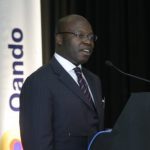...To get all news updates, Join our WhatsApp Group (Click Here)
Also Join our WhatsApp Channel (Click Here)
West Power & Gas Limited, the parent company of Eko Electricity Distribution Plc (EKEDP) has sacked the immediate former MD/CEO of the electricity distribution company, Ms Tinuade Sanda.
Sanda’s appointment with WPG Ltd was terminated in a letter signed by the company chairman, Charles Momoh and dated April 17, 2024.
The letter titled, ‘Termination Of Contract Of Employment,’ said Ms Sanda’s termination of employment takes effect from the date on the letter.
It reads, “We refer to your contract of employment dated April 1, 2022, signed between you and WPG Limited [the “Contract”].
“We hereby advise you that your services are no longer required and accordingly your employment with WPG Ltd is hereby terminated effective April 17, 2024, in accordance with clause 10.2 of the Contract.
“WPG Ltd is obligated to pay you three months salary in lieu of notice and hereby advise you that the due amounts have been credited to your account.
“You are requested to kindly return all company’s properties (whether WPG or EKEDP) in your possession which will include but not limited to laptops, identity card, and status car upon your receipt of this letter.”
“We wish you all the best in your future endeavours,” it added.
On March 26, Society Reporters reported that Ms Sanda had been suspended by EKEDP and directed to return to WPG, from where she had been seconded to the electricity company.
The suspension was in line with a directive of the Nigerian Electricity Regulatory Commission (NERC) to the EKEDP board to suspend with immediate effect all the workers of WPG Limited working with the company.
WPG is a limited liability company incorporated under the laws of the Federal Republic of Nigeria, which has a stake in EKEDP. The consortium of local businesses acquired a 60% stake and controlling interest in EKEDP (Eko Disco).
We gathered that the directive might be connected with the recent petition by some concerned staff members of EKEDP to the Vice President, Senator Kashim Shettima; Independent Corrupt Practices and Other Related Offences Commission (ICPC), and the Economic and Financial Crimes Commission (EFCC) for intervention in the alleged endemic corruption in the management of the electricity distribution firm.
Although the company had dismissed the allegation, describing it as unfounded, the accusers continued to push for external investigation.
Society Reporters reported on March 18, that the Board of Directors and Management of the electricity distribution company had cleared all the staff members accused of corruption and other fraudulent practices.
The Board in a statement signed by its Chairman, Dere Otubu, titled “Eko Disco Management Cleared In ‘Ghost Worker’ Investigation,” said that the investigation into the ‘ghost workers’ allegations had been concluded and findings indicated that the allegations of fraud, negligence, or conspiracy against some members of staff were unfounded.
However, in compliance with the directive of NERC, the Board Chairman, Otubu, directed Ms Sanda to leave her position as MD/CEO of EKEDP, as she was also seconded from WPG.
But reacting to the report, Director and Chairman, Legal and Regulatory Committee, Mr. Babor Egeregor, faulted the Board Chairman’s letter suspending the MD/CEO and others on secondment, insisting that Ms Sanda remained the CEO of EKEDP.
Indeed, we learnt that following the directive, the MD/CEO, Chief Legal Officer, Chief Finance Officer, Chief Human Resources Officer, Chief Auditor and Compliance Officer and others on secondment at the company handed over their handover notes to their subordinates as directed.
A copy of the letter addressed to the MD/CEO signed by the board chairman, dated March 25, 2024 and obtained by us, is titled: ‘Implementation Of NERC Directive On Seconded Staff.’
The letter read, “We have received a NERC directive dated March 21, 2024, which instructed Eko Electricity Distribution Plc inter alia, as follows: ‘EKEDC is hereby directed to ensure that all staff working for the utility are employed by the utility directly, bound by applicable service conditions that are applicable to the employees of the utility and paid through the utilities payroll.’
“The Disco is obligated to obey these directives due to the powers of NERC as stipulated in the Electricity Act 2023. In compliance with the above directive, all seconded staff from WPG Ltd are being released by Eko Electricity Distribution Plc and returned to WPG Ltd.
“You are hereby relieved of your role, office, and position at Eko Electricity Distribution Plc effective immediately and returned to WPG Ltd your Employer.
“You are further directed to hand over to the highest ranking staff of Eko Electricity Distribution Plc under you.
“We hereby record our appreciation of your valuable services and contribution to the growth and successes achieved by Eko Electricity Distribution Plc over the years as a seconded staff from WPG.”
A source told this platform that those affected were discovered to have been operating with a ‘double standard’ on the job.
The Director of IT department, JP Attueyi, a WPG staff member also seconded to EKEDC, swiftly handed over to the most senior person in his department.
In his handover note, addressed to the IT Department and Temitope Odufuwa, dated March 25, Attueyi said it was in compliance with the directive of the chairman.
It partly read: “As you may be aware, I am a WPG staff seconded to EKEDC – WPG owns EKEDC. Today I got an email from the EKEDC Chairman saying that all WPG staff have been recalled back to the parent company effective immediately. As such, I will be handing over to Tope to run the IT department.”
“Please give him the necessary support as we navigate this period,” he wrote.
You can get every of our news as soon as they drop on WhatsApp ...To get all news updates, Join our WhatsApp Group (Click Here)
Also Join our WhatsApp Channel (Click Here)

















